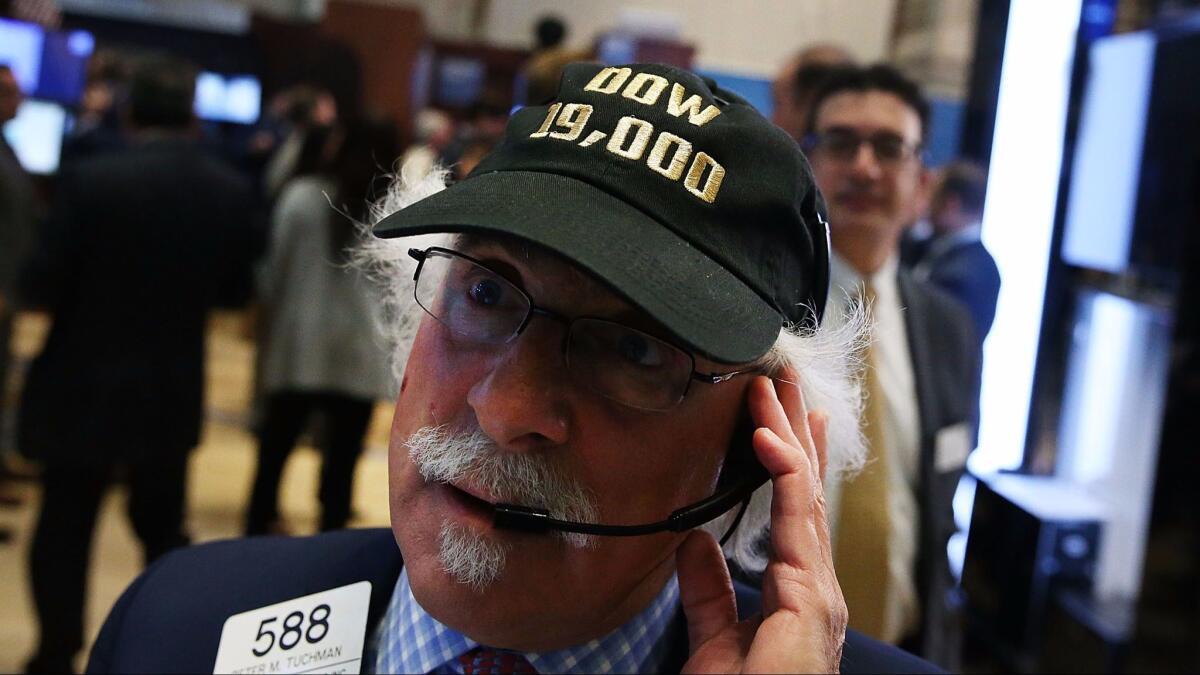Dow closes above 19,000 for the first time ever

The Dow Jones industrial average surpassed 19,000 for the first time as a post-election rally drove indexes further into record territory. Discount store chains made large gains, but healthcare companies tumbled.
Stocks opened solidly higher Tuesday after setting records Monday. They gave up some of their gains around midday but reached new highs late in the afternoon. Healthcare stocks slumped after weak results from medical device company Medtronic. Retailers soared after strong earnings from Dollar Tree and Burlington Stores.
“The consumer in general is far more budget-conscious than they were in previous generations,” Ken Perkins, president of research firm Retail Metrics, said of discount chains.
The Dow went up 67.18 points, or 0.4%, to 19,023.87. The Standard & Poor’s 500 index advanced 4.76 points, or 0.2%, to 2,202.94. The Nasdaq composite climbed 17.49 points, or 0.3%, to 5,386.35.
The Russell 2000 index, which tracks smaller companies, continued to set records as it traded higher for the 13th day in a row. It jumped 0.9%.
The Dow has closed at a record high six times in the two weeks since the presidential election, but trading volume has fallen in recent days. U.S. trading will be closed Thursday for Thanksgiving and markets will close early Friday.
Shoppers continued to flock to discount stores. Dollar Tree raised its profit and sales forecasts after the chain reported solid results in the third quarter. Burlington Stores also raised its outlook after it posted a larger profit than analysts expected. Dollar Tree shares jumped 8.2% to $88.68 and Burlington Stores stock leaped 16% to $86.04.
Other retailers such as Home Depot, TJX and Signet Jewelers also rose as consumer stocks reached all-time highs. Perkins, of Retail Metrics, said that chains such as Dollar Tree were able to win over new customers after the Great Recession, and that low-cost clothing companies like TJX, the parent of TJ Maxx, have also performed well since that time.
Healthcare stocks, which are still trading lower than they were at the start of this year, took hefty losses after Medtronic, one of the world’s largest medical device companies, posted weak results.
Matt Miksic, a medical device analyst for UBS, said some investors worried that Medtronic’s results mean a lot of drug and medical device companies will face slower growth. Miksic said Medtronic reported weak sales “across pretty much every one of their categories in the U.S.”
The company also cut its profit guidance. Its shares sank 8.7% to $73.60. Healthcare products giant Johnson & Johnson slid 2% to $112.74, and Abbott Laboratories, which makes infant formula, drugs and medical devices, dropped 4.2% to $38.10.
Medical supplier Patterson Cos. plunged 16.7% to $39.56, a three-year low. The company cut its profit forecast and said its dental business struggled and its animal health business was hurt by weak prices for brand-name drugs.
Campbell Soup’s profit in its fiscal first quarter was better than expected thanks to lower expenses and better sales of snacks such as Pepperidge Farm. Hormel, the maker of Spam, reported better results from its refrigerated foods business and its Jennie-O turkey unit. Hormel also gave solid guidance for the current fiscal year. Campbell Soup shares rose 3.6% to $57.02 and Hormel rose 2.6% to $35.86.
Dr. Pepper Snapple Group said it will buy fruit drink maker Bai Brands for $1.7 billion. Bai Brands markets its drinks as having less calories than other brands and doesn’t use artificial sweeteners. Dr. Pepper Snapple stock ticked up 2.6% to $87.50.
Industrial companies, including makers of aircraft and engines and other equipment, continued to rise. Companies including Boeing, Lockheed Martin and Northrop Grumman were trading around record highs before the election, and they have done better than the broader market since then. Boeing climbed 1.7% to $149.52 on Tuesday.
Oil prices wobbled and energy companies fell. Benchmark U.S. crude fell 21 cents to $48.03 a barrel in New York. Brent crude, the international standard, rose 22 cents to $49.12 a barrel in London. The price of oil had risen about 4% on Monday.
Investors continued to sell short-term bonds, which sent their prices lower. The yield on the two-year Treasury note rose to 1.09%, its highest in six years. Longer-term bond prices slipped. The yield on the 10-year Treasury note rose to 2.32% from 2.31%.
The dollar, which is trading around 13-year highs, was little changed. It rose to 111.14 yen from 111.07 yen. The euro inched up to $1.0624 from $1.0612.
Wholesale gasoline ticked up 1 cent to $1.41 a gallon. Heating oil remained at $1.53 a gallon. Natural gas rose 3 cents to $2.98 per 1,000 cubic feet.
Gold rose $1.40 to $1,211.20 an ounce. Silver rose 11 cents to $16.63 an ounce. Copper rose 3 cents, or 1.2%, to $2.54 a pound.
Britain’s FTSE 100 rose 0.6%. France’s CAC 40 advanced 0.4% while the DAX in Germany rose 0.3%. Japan’s Nikkei 225 dipped after a powerful earthquake in northern Japan, but the index finished up 0.3%. The earthquake set off a small tsunami, but it appeared to cause only minor damage and injuries. South Korea’s Kospi rose 0.9% and the Hang Seng in Hong Kong climbed 1.4%.
ALSO
How Trump could use the presidency to help his business interests
Inside the Indian IRS scam that cheated U.S. taxpayers out of millions
A family feud plays out at L.A.-based movie theater chain Reading International
UPDATES:
1:45 p.m.: This article was updated with closing prices, context and analyst comments.
1:35 p.m.: This article was updated with the close of markets.
This article was originally published at 7:45 a.m.






